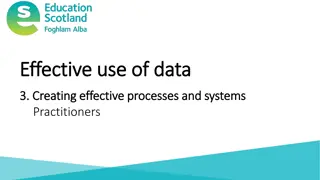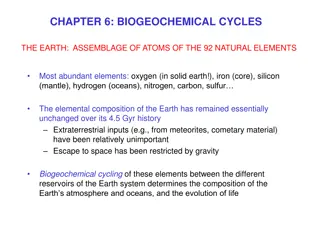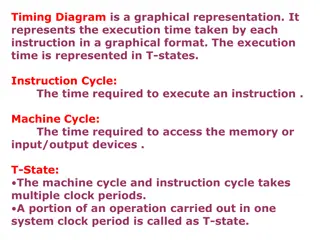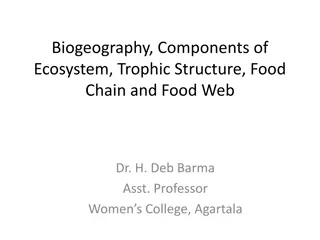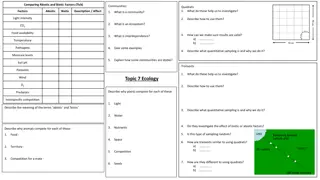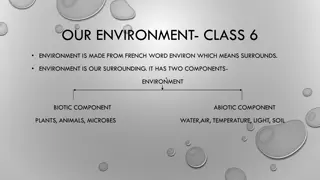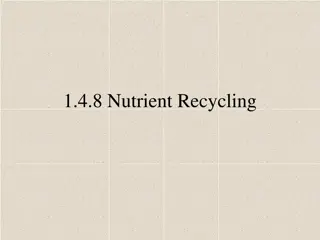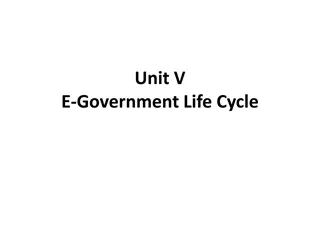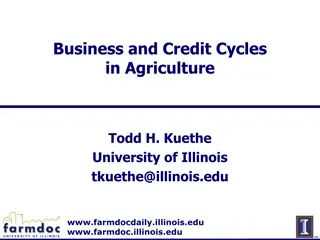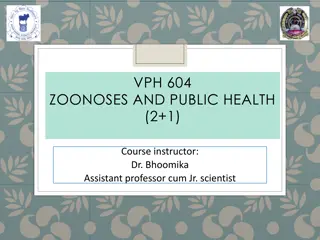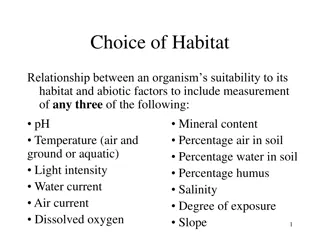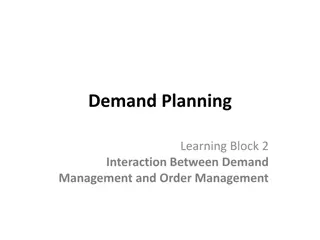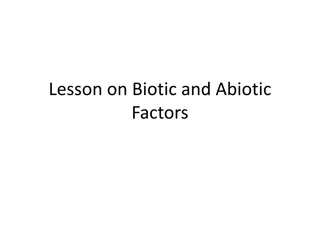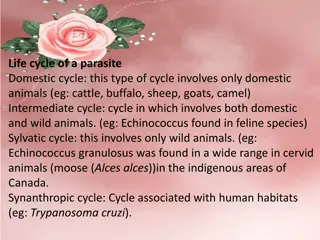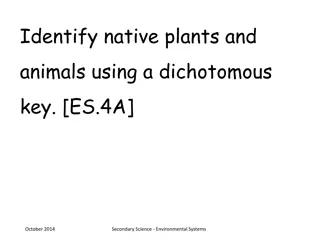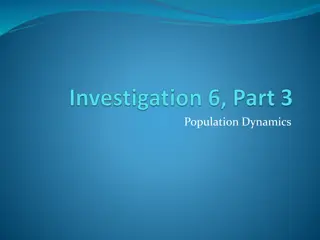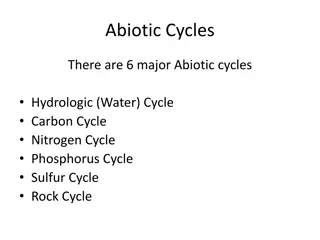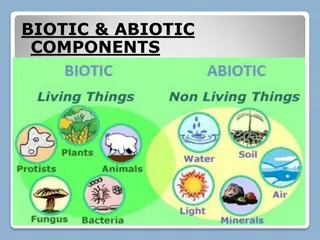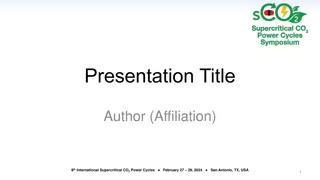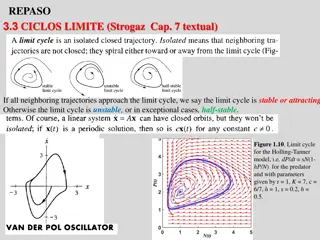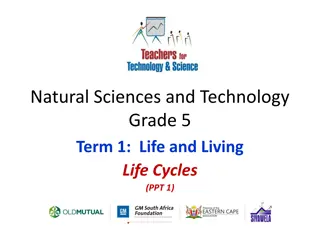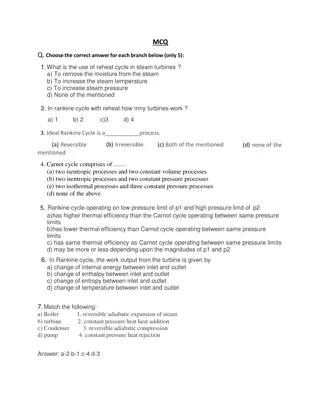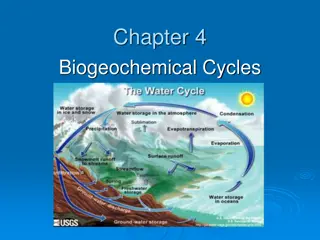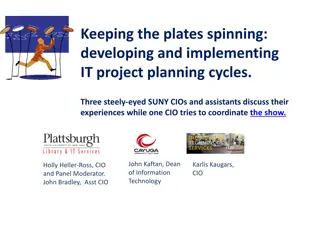Relevance of Countercyclical Fiscal Policy and Fiscal Acyclicality
This literature review examines the effectiveness of countercyclical fiscal policies in stabilizing output and enhancing welfare, with a focus on the correlation between public spending cycles and GDP cycles. The study analyzes examples from Sweden and Argentina to showcase the impact of fiscal poli
2 views • 29 slides
FUTURE OF EFFORT REPORTING
Changes in effort reporting system transitioning from eFECS to ECC for documenting faculty effort and payroll certifications, with unified reporting cycles and improved access to Effort Statements in ECC. GCCRs will maintain the same reporting cycles as Project Statements. Deadline for certification
1 views • 14 slides
Understanding the Carbon Cycle: Reservoirs, Dynamics, and Importance
Earth's carbon cycle plays a crucial role in sustaining life, with carbon moving through various reservoirs and processes. This cycle involves short-term terrestrial and marine cycles, as well as long-term cycles influenced by volcanic activity and rock weathering. Understanding carbon reservoir dyn
6 views • 45 slides
Effective Data Processes and Systems Workshop Overview
The workshop covers the importance of effective data processes and systems, defining data processes, scenarios, reflection, feedback, and more based on national guidance and research. Participants learn to ensure accuracy, update data regularly, and integrate data cycles into improvement cycles for
0 views • 26 slides
Insights into Biogeochemical Cycles and Evolutionary History of Earth
The Earth's elemental composition has remained constant over its 4.5 billion-year history, with biogeochemical cycles playing a vital role in shaping the atmosphere and oceans. The evolution of oxygen, ozone, and life on Earth is intricately linked to these cycles. Contrasting Earth and Venus, it's
0 views • 15 slides
Understanding Timing Diagrams and Machine Cycles in Microprocessors
Timing diagrams provide a visual representation of execution times for instructions in a microprocessor, measured in T-states. This content delves into the concept of machine cycles, such as Opcode fetch cycle and Memory read cycle, in 8085 microprocessors. Exploring the T-states within each cycle,
0 views • 27 slides
Understanding Biogeography, Ecosystem Components, Trophic Structure, Food Chain, and Food Web
Biogeography delves into the origin, distribution, and adaptations of plants and animals, aiding in earth surface differentiation. Ecosystems involve interactions between biotic and abiotic elements, forming trophic structures, biodiversity, and material cycles. Learn about the concepts, definitions
0 views • 29 slides
Exploring Abiotic and Biotic Factors in Communities
Investigating abiotic and biotic factors in communities through quadrats helps study interactions like light intensity, CO2 levels, food availability, and more. It ensures validity by considering interdependence, competition, and sampling techniques like transects. Examining adaptations in animals a
1 views • 4 slides
Understanding Our Environment: Class 6 Overview
The environment, derived from the French word "environ" meaning surrounds, encompasses both biotic (living) and abiotic (non-living) components. Biotic components include plants, animals, and microbes, while abiotic components consist of water, air, temperature, light, and soil. Plants are producers
1 views • 9 slides
Nutrient Recycling in Ecosystems
Nutrient recycling in ecosystems involves the continuous breakdown and exchange of elements between living and non-living components, ensuring sustainability and no long-term drain on Earth's nutrients. This process includes decomposition of organic material by bacteria and fungi, uptake of nutrient
1 views • 23 slides
Contrasting E-Government and General Project Life Cycles
E-Government project life cycles differ significantly from general project life cycles, with the former's focus on management and stakeholder needs, leading to challenges in requirements gathering and adapting to changing priorities. The Waterfall model used in general projects may result in project
0 views • 9 slides
Understanding Trade Cycles: Economic Fluctuations and Phases
Trade cycles, also known as business cycles, are fluctuations in economic activities, affecting employment, output, income, prices, and profits. These cycles consist of phases including depression, recovery, prosperity, and recession. During booms, economic activities peak, while recessions see a sl
7 views • 7 slides
Understanding Ecosystems: Structure, Components, and Functions
Ecosystems are intricate units where living organisms interact with each other and the environment. They consist of biotic (living) and abiotic (non-living) components, interrelated in a chain of interactions. Biotic components include autotrophs, heterotrophs, and decomposers, while abiotic compone
0 views • 15 slides
Understanding Ecology: Interactions in Ecosystems
Explore the intricate web of interactions in ecosystems through the study of ecology. Learn how biotic and abiotic factors shape ecosystems, trace energy flow, and understand nutrient cycles. Discover the importance of biodiversity and the impact of human activities on the biosphere. Dive into topic
0 views • 51 slides
Exploring Pseudo-Goodwin Cycles in a Minsky Model
This paper delves into the dynamics of Pseudo-Goodwin cycles within a Minsky model, examining the counter-clockwise movement of output and wage share. It distinguishes between true Goodwin cycles and pseudo variants, highlighting the role of income distribution, debt, and demand in shaping economic
0 views • 27 slides
Understanding Ecosystems: A Comprehensive Guide
An ecosystem comprises both living (biotic) and non-living (abiotic) factors interacting in a specific area, with populations, communities, and ecology playing essential roles. Abiotic factors like temperature, water, sunlight, and wind influence species distribution, while biomes categorize ecosyst
1 views • 23 slides
Understanding Business and Credit Cycles in Agriculture
This research delves into the relationship between business and credit cycles in agriculture, focusing on the impact on operating margins, farmland prices, and lending practices. It explores the linkage between asset values and credit, highlighting the significance of farmland as collateral in farm
0 views • 23 slides
Understanding Zoonoses in Public Health: Classification and Transmission Cycles
Zoonoses, diseases transmitted from animals to humans, are classified based on etiological agents, transmission cycles, and reservoir hosts. The classification includes bacterial, viral, rickettsial, chlamydial, mycotic, and parasitic zoonoses. Transmission cycles are categorized as direct, cyclozoo
0 views • 19 slides
Exploring the World of E-Cycles: Innovation, History, and Legal Aspects
Delve into the realm of E-Cycles through an informative journey covering the North East Electric Conclave, advancements in e-mobility, and the legal framework for E-Cycles in India. Uncover the fascinating history of E-Cycles, from their inception in the 1890s to their modern-day classifications and
3 views • 23 slides
Understanding Organism Habitat Suitability Through Abiotic Factors
Explore the relationship between organisms and their habitats based on abiotic factors like pH, temperature, light intensity, and more. Learn how to measure and relate these factors to the organisms' choice of habitat, with practical investigation procedures and result analysis provided.
0 views • 59 slides
Demand Planning and Order Management: Enhancing Efficiency
Explore the intricate relationship between demand planning and order management, crucial for optimizing customer order fulfillment cycles. Learn key principles, tools, and techniques to enhance communication and manage demand effectively, along with contemporary approaches and e-commerce fulfillment
1 views • 28 slides
Exploring Biotic and Abiotic Factors in Ecosystems
This lesson delves into the importance of biotic and abiotic factors in ecological systems. Students will learn to differentiate between living (biotic) and non-living (abiotic) components affecting organisms such as mice and plants. Through engaging activities and challenges, participants will gras
0 views • 21 slides
Plant Reproduction and Life Cycles in Biology II for Non-Majors
Explore the complex processes of plant reproduction, life cycles, and the alternation of generations in biology. From the fusion of male and female gametes to the development of sporophytes and gametophytes, delve into the stages and structures involved in the reproduction of gymnosperms and angiosp
0 views • 25 slides
Understanding the Complexities of Parasite Life Cycles and Host Interactions
Parasites exhibit diverse life cycles and behaviors, with cycles ranging from domestic to sylvatic environments. Factors influencing parasite diseases include host specificity, immunity, and host-parasite interactions. Parasitism can alter host behavior, impacting ecological dynamics. Immunology pla
0 views • 9 slides
Understanding Ecology: Key Concepts and Types Explained
Ecology, a vital branch of science, delves into the relationships between organisms and their environment. It encompasses biotic and abiotic factors, studying how living and non-living elements interact within ecosystems. Biotic components include living organisms like plants and animals, while abio
0 views • 7 slides
Exploring Ecosystem Dynamics: Environmental Systems Study
In this Environmental Systems study, students delve into identifying native plants and animals using a dichotomous key, assessing their roles within local ecosystems, and comparing them to other biomes. They also analyze abiotic cycles such as rock, hydrologic, carbon, and nitrogen cycles, and evalu
0 views • 40 slides
Understanding Processor Cycles and Machine Cycles in 8085 Microprocessor
Processor cycles in microprocessors like 8085 involve executing instructions through machine cycles that are essential operations performed by the processor. In the 8085 microprocessor, there are seven basic machine cycles, each serving a specific purpose such as fetching opcodes, reading from memor
0 views • 17 slides
Understanding Population Dynamics in Ecosystems
Exploring the concept of carrying capacity, examining real data from Mono Lake, comparing predictions to actual data, discussing biotic and abiotic limiting factors, and understanding how organisms can impact populations without direct predation. Dynamic ecosystems are constantly changing, as eviden
0 views • 13 slides
Understanding Abiotic Cycles in Ecosystems: Hydrologic, Carbon, Nitrogen, and More
Abiotic cycles play a crucial role in regulating ecosystems. The hydrologic cycle involves processes like evaporation, condensation, precipitation, and transpiration. The carbon cycle relies on photosynthesis, respiration, and human activities like deforestation and burning fossil fuels. The nitroge
0 views • 20 slides
Understanding Biotic and Abiotic Components in Ecosystems
Explore the relationship between biotic (living) and abiotic (non-living) components in ecosystems. Learn about the roles of plants, animals, decomposers, and scavengers. Discover the importance of biodegradable and non-biodegradable materials in the environment.
0 views • 21 slides
8th International Supercritical CO2 Power Cycles Conference in San Antonio, TX, USA
The 8th International Supercritical CO2 Power Cycles Conference is scheduled from February 27-29, 2024, in San Antonio, Texas, USA. This conference aims to bring together experts in the field to discuss the latest advancements and research in supercritical CO2 power cycles. The event will feature pr
0 views • 9 slides
SMC Alliance Annual Meeting: Defeating Malaria Together - Overview and Planning for 2022
The SMC Alliance Annual Meeting discussed the methodology for data collection and analysis, past SMC campaign data, coverage and trends in average number of children covered since 2014. It highlighted countries performing 5 cycles, those with incomplete 4th cycles, and those focusing on 3 cycles. Th
0 views • 8 slides
Ecology Team Trivia: Test Your Environmental Knowledge!
Explore the world of ecology through a fun team trivia game. Discover key vocabulary related to ecosystems, energy roles, and more. Challenge yourself to become the leader of the pack by mastering ecological concepts. Test your knowledge on topics such as abiotic factors, population dynamics, climat
0 views • 43 slides
Understanding Limit Cycles and Bifurcations in Dynamical Systems
Explore the stability of limit cycles and bifurcations in dynamical systems through examples like the Holling-Tanner model. Discover the significance of stable limit cycles and the role of Liapunov functions in forbidding closed orbits. Delve into the intriguing behavior of trajectories in bottlenec
0 views • 16 slides
Understanding Life Cycles: Plants and Animals
Explore the fascinating world of life cycles in plants and animals through engaging visuals and descriptions. From the process of germination to the different stages of growth and development, discover how living organisms move through their life cycles. Topics include plant pollination, seed disper
0 views • 14 slides
Engineering Thermodynamics Multiple Choice Questions
This content covers various topics related to engineering thermodynamics through multiple-choice questions. It includes concepts such as the use of reheat cycles in steam turbines, ideal Rankine cycles, Carnot cycles, and the efficiency of different cycles. Questions on the Rankine cycle, working fl
0 views • 4 slides
Animal Life Cycles Review and Group Challenge
Explore the world of animal life cycles through a trivia game and group challenge. Test your knowledge on organisms, embryos, vertebrates, invertebrates, and more. Dive into rounds of tricky taboo questions and identify adult animals from their offspring. Discover common traits among mammals, unders
0 views • 8 slides
Understanding Biogeochemical Cycles and Their Impact on Earth's Ecosystems
Biogeochemical cycles involve the cycling of essential nutrients like water, carbon, oxygen, nitrogen, phosphorus, and sulfur through abiotic components like water, air, soil, and rock to biotic components like plants, animals, fungi, and bacteria. Humans play a significant role in these cycles, imp
0 views • 24 slides
Thermodynamic Calculators for Comprehensive Analysis of Systems, Processes, and Cycles
Explore a series of simplification in the TESTcalc Tree, leading to the accurate analysis tool system states and basic tools for uniform and non-uniform systems. Access TESTapps for a variety of thermodynamic calculators catering to specific, generic, mixing, non-mixing, and combustion systems, alon
0 views • 12 slides
Keeping the Plates Spinning: Insights from SUNY CIOs on IT Project Planning Cycles
Three SUNY CIOs and their assistants share experiences on IT project planning cycles, emphasizing the crucial role of planning for success. Lack of planning can lead to chaos and inefficiencies. The discussion highlights the need for strategic IT enablement in the academic enterprise and the importa
0 views • 35 slides



